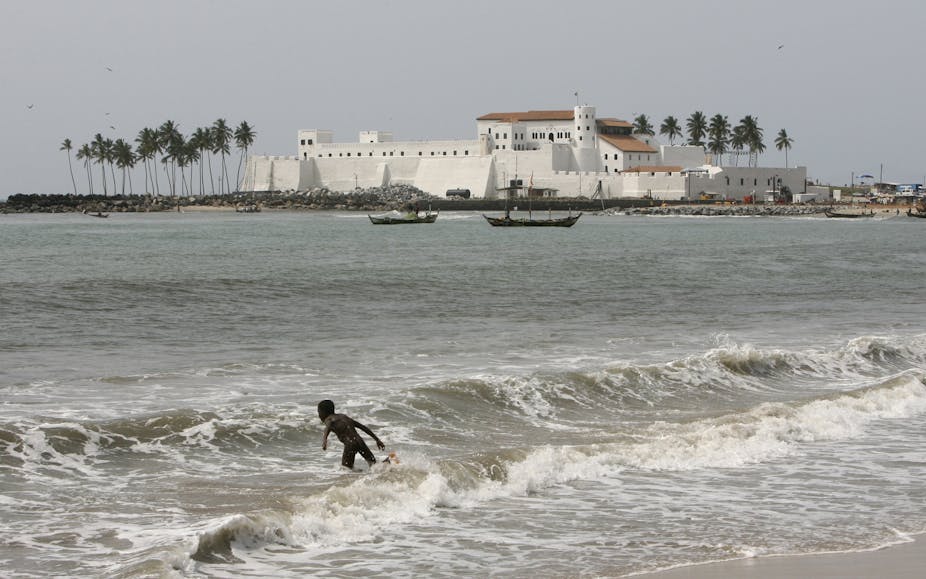Ghana’s meandering coast is dotted with numerous forts and castles. These monuments were built between the 15th and 17th centuries by early modern European chartered companies. They were initially used for trading gold and other commodities. After Ghana became enmeshed in the trans-Atlantic slave trade in 1650 they were used as spaces to buy, torture and hold captured people before shipping them away from Africa.
Over the past three decades these landmark monuments have taken on another role. Ghana has developed a significant heritage tourism industry and the monuments have become tourist attractions. They particularly draw people of the original historic African diaspora.
The descendants of Africans who were captured and enslaved in the western Atlantic World return to the continent – and to the monuments – for a number of reasons. For many, it is a way to reconnect with their ancestry and find a sense of belonging in the African world. The memory of Africa can also be a source of strength, pride and identity.
Heritage tourism in Ghana provides an important opportunity for diasporic Africans to connect with their history and identity. But in the context of global neoliberal capitalism it also creates an uncomfortable continuity. Today the forts and castles of Ghana’s coast continue to fulfil one of the key purposes for which they were first built – making money. This trend has distorted the relationship between the historic African diaspora and the continent.
From independence to neoliberalism
The rise of Ghana’s heritage tourism industry coincided with a shift in its economic policy orientation. From independence in 1957 well into the 1980s the economy was largely state controlled. Its policies included government interventions aimed at easing the people’s hardships. But by the end of the 1990s Ghana’s economic, social and political policies had, by and large, become aligned with the global neoliberal agenda.
The economic and ideological system of neoliberalism is centred on the primacy of private property and private enterprise. Government intervention in the economy is discouraged. Neoliberalism operates on principles such as subsidy removal, social spending cuts and the privatisation of social services.
These free market and pro-business principles were imposed on developing countries desperate to secure loans to salvage and stabilise their erratic economies. Powerful international agencies made loans conditional on countries adopting neoliberal reforms. The Bretton Woods twin financial institutions of the World Bank and the International Monetary Fund did the same. In this way they were able to reshape the economies of many African countries, including Ghana’s.
The ultimate objective was to make developing countries toe the line of profit maximisation in both public and private sectors.
Tourism potential and profit
Tourism was identified and bolstered by the government as a viable, reliable and productive source of revenue within the framework of global neoliberalism.
Ghana boasts an irresistible package of celebrated cultural heritage. In addition to its extant European castles and forts, it also has a number of old slave markets, slave routes and slave cemeteries.
In 1993 Ghana boosted its tourism attractiveness with a US$10m investment project. This was planned and implemented by the Ghanaian authorities in conjunction with the United Nations Development Programme and the United States Agency for International Development.
It involved, among other things, the development of the Kakum National Park as well as the preservation and renovation of the Cape Coast and Elmina Castles. As if to glorify these sites, Unesco declared the castles and forts World Heritage sites. They were furnished with new museums and other tourist facilities.
The new policy targeted the massive patronage of the historic African diaspora, particularly those from the US, as effective partners in development.
Within the neoliberal framework, both the ideology of Pan-Africanism and the legacy of the trans-Atlantic slave trade became marketable commodities.
Tourists, customers and investors
African Americans were invited to come back to their “roots”. But increasingly they became aware that they were regarded as tourists and customers in Ghana. Some were also encouraged to become stakeholders in the broader project of capitalist development. Land grants and other business incentives were promised to the diaspora. The objective was to encourage foreign direct investment in the economy’s various sectors.
The travel and tourism sector was one where some of the historic African diaspora entered and did brisk business. Those with the necessary resources and expertise competed with their Ghanaian counterparts. By forming tour companies, they facilitated travel to the country in appreciable numbers. Others also invested in hotels and beach resorts.
In 2015 tourism and travel directly contributed a total of around GHC4.5 million (more than US $1 million) to Ghana’s GDP. This amounts to about 3.3% of national GDP.
This is good for business. But what does it mean for relations between the continent and the diaspora? Ghana’s forts and castles, among other things, were once used to make profit off African bodies. Today they continue to exist as money-making facilities. The legacy of slavery has been turned into a commodity and diasporic Africans are cast as tourists, investors, customers and foreigners – rather than members of the African family to which they belong.

